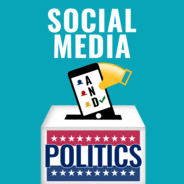Dr. Alice Marwick, Assistant Professor of Communication at the University of North Carolina at Chapel Hill, guests to discuss the findings of her research report: Media Manipulation and Disinformation Online.
Dr. Marwick breaks down how far-right groups use the internet and social media to promote their ideologies. We also talk about radicalization, conspiracy theories, and differences in online activity between the far-right and far-left.
Check out the report here.
And don't forget to sign up for the Social Media and Politics newsletter!

Politik
Social Media and Politics Folgen
Social Media and Politics is a podcast bringing you innovative, first-hand insights into how social media is changing the political game. Subscribe for interviews and analysis with politicians, academics, and leading digital strategists to get their take on how social media influences the ways we engage with politics and democracy. Social Media and Politics is hosted by Michael Bossetta, political scientist at Lund University. Check out the podcast's official website: https://socialmediaandpolitics.org.
Folgen von Social Media and Politics
185 Folgen
-
Folge vom 24.02.2019Far-Right Extremism, Media Manipulation, and Disinformation Online, with Dr. Alice Marwick
-
Folge vom 10.02.2019Digital Political Campaigning in Britain, with Dr. Rachel GibsonDr. Rachel Gibson, Professor of Politics at the University of Manchester, discusses British political parties' digital campaigning from websites to social media. We take a longitudinal dive into the development of digital campaigning in the UK, and compare it to campaigning practices in the US. Then, we examine how citizens' political participation is evolving through their use of digital communication technologies.
-
Folge vom 31.01.2019Russian Disinformation and Social Media in Ukraine, with Kateryna KrukKateryna Kruk, Analyst at StopFake and Special Fellow at the European Values Think-Tank, discusses the development and strategies of Russian disinformation in Ukraine. Kateryna shares her experiences using Twitter to promote awareness about the Euromaidan protests, and we dig deeper into the role social media played in the 2014 Ukrainian Revolution. We then discuss how Russian used digital media to spread disinformation around the annexation of Crimea and armed conflict in Donbass. Kateryna also shares her insights into how to use social media for government communication, based on her work with the Ukrainian Parliament. Other topics include deep fakes and disinformation ahead of the 2019 Ukrainian Presidential elections.
-
Folge vom 20.01.2019News Finds Me Perception and Social Media, with Dr. Homero Gil de ZúñigaDr. Homero Gil de Zúñiga, Professor at the Department of Communication at the University of Vienna, guests to discuss the "News Finds Me Perception" and the role of social media in it. Citizens who believe that the news will simply find them are heavy users of social media, and Dr. Gil de Zúñiga's research shows that this negatively impacts political interest and political knowledge. In the episode, we parse out the effects and implications of News Finds Me for democracy. The two articles discussed in the episode are: News Finds Me Perception and Democracy Multi-Platform News Use and Political Participation Across Age Groups
